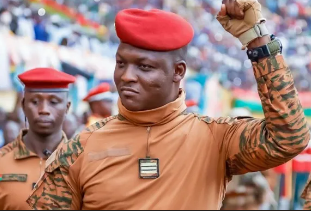The Nigeria–Burkina Faso Relationship: A Historical Perspective.
- Home
- The Nigeria–Burkina Faso Relationship: A Historical Perspective.

The Nigeria–Burkina Faso Relationship: A Historical Perspective.
Fredric Jameson, the American theorist, once said, “Always historicize,” emphasizing the importance of understanding events through their historical context. Applying this to the current diplomatic strain between Nigeria and Burkina Faso reveals much about the ideological and political rifts shaping their relationship today.
Though tensions have not yet escalated beyond diplomatic coldness, they could worsen. Burkina Faso’s aggressive propaganda and the role of Russian-linked groups such as the Wagner Group (now rebranded as the Russian Corps) add a layer of complexity. These influences are suspected of undermining democratic institutions across West Africa, particularly in key nations like Nigeria.
Ironically, Russia—once mocked as “Burkina Faso with nuclear weapons”—is now using media and propaganda to bolster its influence in Burkina Faso. Among the three Francophone nations that recently withdrew from ECOWAS, Burkina Faso has been especially hostile toward Nigeria, fueled by longstanding ideological divisions.
Historically, West Africa was once a culturally and economically unified region before colonialism fractured it into isolated nation-states. Stories abound of linguistic and cultural ties that endure today—from Yoruba speakers in Guinea and Burkina Faso to the Aku community in Gambia. These shared roots highlight what has been lost to colonially imposed borders.
Both Nigeria and Burkina Faso share similar post-independence struggles: poverty, corruption, and frequent military coups. In Burkina Faso, the Mossi people—known for their resistance to colonial rule—dominate national identity. Political instability has marked the country since independence, with a series of military rulers rising and falling, often violently.
In the early 1980s, ideological battles within Burkina Faso’s military led to the rise of Major Thomas Sankara, a charismatic reformer and revolutionary. Appointed as Prime Minister under Jean-Baptiste Ouedraogo, Sankara was later imprisoned by his superior—an error that led to his rescue and installation as president by Blaise Compaoré, his friend and eventual betrayer.
Sankara’s brief presidency left a lasting legacy. He was admired for his vision, simplicity, and progressive ideals. His 1980s visit to Nigeria made a strong impression, alarming regional leaders wary of his revolutionary influence. He was ultimately assassinated in 1987 in a coup led by Compaoré, whose authoritarian rule lasted 27 years.
Nigeria’s reaction to Sankara’s fall was notably pragmatic. While some African leaders condemned the coup, Nigeria welcomed Compaoré’s envoys, drawing criticism for its diplomatic stance.
Fast forward to today, Captain Ibrahim Traoré now leads Burkina Faso. Though energetic and militant, he lacks Sankara’s visionary leadership and seems more influenced by foreign interests, particularly Russia. Unlike Sankara, Traoré risks becoming a pawn in global power games.
Portraying Traoré as a revolutionary figure is misleading. The era of military-led transformation in Africa has largely passed, and Burkina Faso’s repeated instability is a cautionary tale. While Traoré has potential, meaningful change will require more than rhetoric and military bravado. He must shed theatrics, focus on governance, and avoid becoming a tool in geopolitical power struggles.
Manager – Oversees the daily operations, editorial planning, and strategic direction of the platform. A graduate with a solid academic foundation in media and communication, Faith brings a wealth of experience to the TokinPoint.
Discover more from TokinPoint
Subscribe to get the latest posts sent to your email.
- Share
FAITH MIMDOO KEGH
Manager - Oversees the daily operations, editorial planning, and strategic direction of the platform. A graduate with a solid academic foundation in media and communication, Faith brings a wealth of experience to the TokinPoint.
